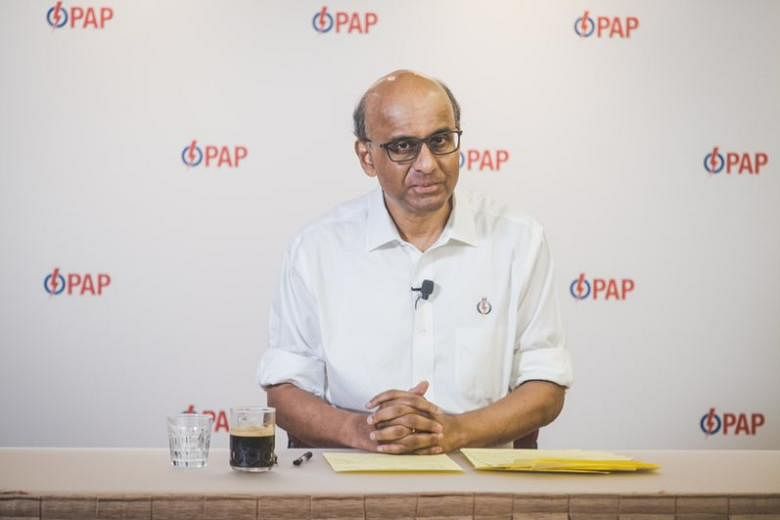Singapore can emerge from the Covid-19 crisis as a better and more inclusive society, which allows everyone to move up an escalator of rising skills and wages to better lives, said Senior Minister Tharman Shanmugaratnam.
To do so, the Government would have to play a key role, making deeper interventions earlier, to help level up children from less fortunate families from an earlier stage in their lives.
There would also be more help for workers to boost their productivity so that they continue to see their skills and wages move up over the years, said the Coordinating Minister for Social Policies.
While government policies are important, Singapore should retain a social ethos where people take pride in standing on their own feet, while also taking responsibility for one another, he said.
In a speech on strategies for an inclusive society and social mobility, live-streamed on the People's Action Party's Facebook page yesterday, he outlined Singapore's particular approach towards tackling inequality and ensuring security through every stage of life - from early childhood to working life to the retirement years.
"The aim of all our strategies, economic and social, is to have a more fair and just society, where young people have hope, regardless of what social backgrounds they come from... where everyone can advance in their careers regardless of what qualifications they start with, and where our seniors can look forward to living life fully in retirement, and living life with a sense of security," said Mr Tharman.
Stressing that the Covid-19 outbreak had made this a more important issue, since it was "fracturing societies", he said this goal could be achieved only through programmes that could be sustained across generations.
"This is about real programmes - real programmes that we keep improving, learning over time what works. Never perfect, but constant improvement."
Since social mobility is key to Singapore's fabric, and most inequalities kick in when children are very young, the Government is levelling the playing field with plans to double expenditure in the pre-school sector over the next few years, said Mr Tharman.
It is also preventing a digital divide by ensuring that every child, no matter how poor, has access to broadband Internet and a laptop or computer at home. "We are achieving real progress, but there's a lot more to do," he added.
For those in working life, Mr Tharman highlighted another Singaporean approach that has stood it in good stead: "a massive infusion of skills at every stage of one's career".
Singapore has also managed to keep unemployment numbers much lower than those in other developed countries even during the Covid-19 crisis. The wages of its average worker have risen by a third over the past decade. The wages of low-income workers have risen by even more.
"Fundamentally, because we have raised productivity," said Mr Tharman.
Finally, he touched on the issue of security for seniors.
Mr Tharman said that in every election, there will be politicians who make "very nice-sounding promises" on what should be done to help seniors, including for Central Provident Fund payouts to start earlier or for the Government to pay more of Singaporeans' healthcare costs, such as by subsidising MediShield premiums.
But many of these measures will only end up hurting the very people they are trying to help, he added, resulting in higher tax rates for middle-income households, because nothing comes for free.
"Some promises look appealing, but they actually lead to greater inequality over time," he said. "Think hard about the need for a fair system, a progressive system, and a sustainable system. And that's basically what we're trying to achieve in Singapore."
People have to play their part, too, he said. Singapore could emerge from the Covid-19 pandemic a more inclusive society if everyone finds a way to help others, whether they are the elderly, the less privileged or the less educated.
He urged the younger generation to be more involved in their neighbourhoods and in society, and take part in the Singapore Together movement, which Deputy Prime Minister Heng Swee Keat launched last year for citizens to actively help shape policies.
"For our younger generation, in particular, this is actually a challenge for a generation: building an inclusive society, that doesn't just mimic efforts in other societies, but does it our way - does it in a way that doesn't impose a heavy burden on Singaporeans at large," he said.
"It's not about the Government; it's about Singapore Together. Find your niche, find your passion, the areas you want to work in. And let's help spiral up our whole system, our whole society," he urged.
"It can be done. We can emerge from Covid not more divided, but with a more cohesive society."


